What to Do Before, During and After Power Outages
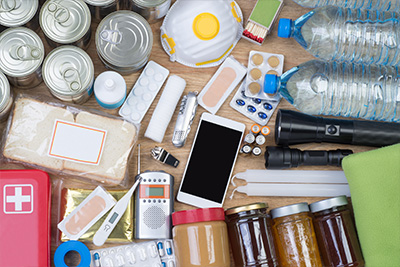
Power outages are always inconvenient, and they can even be dangerous. But with a little knowledge and preparation, you can protect yourself, your home and your belongings for power outages of any duration. Read on to learn what to do when power goes out.
Prepare for a Power Outage
Sometimes you can see a potential power outage coming hours or even days away, such as when severe weather is forecasted. Other times, it may come as a surprise due to an event like a vehicle toppling a utility pole. Some may even be announced in advance, such as when an energy utility announces a temporary rolling power outage to protect the grid during periods of excessive energy demand.
The key to getting through a power outage safely and comfortably is to be prepared for any type of outage, even the ones you don’t see coming.
Prepare an Emergency Kit
Every home should have an emergency kit, and every member of the household should know where it’s stored. The most important items to include are:
- Water; at least three gallons per household member
- Non-perishable food; at least three days’ worth for the entire household
- Flashlights
- Battery-powered radio
- Batteries
- First aid kit
- Prescription medications
You may also want to include copies of important documents, such as birth certificates and insurance policies. Stored food and water should be consumed and replaced periodically to keep the kit fresh.
Prepare Emergency Lighting for Power Outage Safety
A sudden power outage can leave you fumbling through the dark, and this can be hazardous, especially for people with mobility issues. Keeping small flashlights stored in easy-to-reach places throughout your home ensures that you’re never far from an emergency light source. Make sure everyone in the home knows where these are located.
Prepare Backup Power
You can invest in all sorts of backup power solutions, from whole home generators that start automatically to wallet-sized solar panels for charging your phone. Take time to assess your budget and backup power needs so you can make an informed purchase before an emergency occurs.
If you choose a fuel powered generator, be sure to familiarize yourself with all safety guidelines and make a plan for where you will operate the unit. Gas, diesel and propane generators must be operated at least 20 feet from any occupied structure to minimize the risk of carbon monoxide poisoning. You should also ensure your generator is connected safely; extension cords must be rated for generator use and long enough to account for the distance between the generator and the house. If you’d prefer to connect a generator directly to your home’s electrical panel, you should have a device called a transfer switch installed by a licensed electrician.
Generators range in price from a few hundred dollars to several thousand, but you don’t need to spend big to have a little backup power. Small electronics like solar chargers and power banks can be purchased for under $50, giving you a way to power phones, radios and other small electronics in an emergency.
Sign Up for Alerts
Most utilities allow customers to opt-in for text alerts about outages and other events affecting service. If you’re not already registered for these alerts, look on the websites of your utilities or check your most recent energy bills for instructions. In the event of a power outage, your energy utility may be able to text you with an estimated time of service restoration.
Take Advantage of Advance Warning
The tips outlined above will help you be prepared for those power outages you don’t see coming, but if you have the benefit of prior warning, you can do even more. If a hurricane, tropical storm or severe weather outbreak is forecasted for your area, consider taking a few additional steps:
- Clean your fridge and freezer of unwanted and expired foods.
- Put refrigerated and frozen meat and produce inside plastic bags, then put them back in place. If the power is out so long that they become unsafe to eat, this makes it cleaner and easier to dispose of spoiled food.
- Fully charge your mobile devices.
- Fill your car’s gas tank.
- Unplug sensitive electronics around your home, especially if they’re not connected to surge protectors.
During a Power Outage
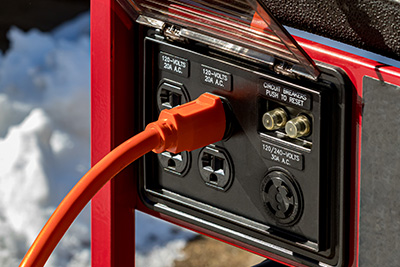
When a power outage begins, the first priority is to make sure everyone in the home is safe. Carefully find your nearest emergency light source if you’re in the dark, then make contact with each member of the household.
Why Is My Power Out?
If the cause of the power outage isn’t readily apparent, you can call your energy utility to report a power outage. If you’ve signed up for text alerts, your utility is also likely to reach out to you. Use your radio and web-connected smartphone, if you have one, to check for updates if you believe the outage is the result of severe weather.
Don’t Use Your Stove or Oven for Heat
If the power goes out during cold weather and shuts down your furnace, you might be tempted to use a gas stove or range for emergency heat. This is a dangerous idea, as it will release carbon monoxide into your home. Carbon monoxide is colorless, odorless and tasteless, and can cause headaches, nausea, dizziness and other symptoms. Prolonged exposure to high levels of carbon monoxide can even be fatal. Instead of using your oven, dress in warm layers, including outerwear, hats and gloves, if necessary. Wrap yourself in a blanket for additional warmth and hang blankets over exterior windows and doors to help block out cold drafts.
Keep the Fridge and Freezer Closed
A lengthy power outage can cause your frozen and refrigerated food to spoil. To help avoid this, keep the fridge and freezer closed until you know spoilage is imminent. Refrigerated foods should be considered unsafe after four hours with no cooling, so if you’re approaching the four-hour mark, it’s time to open the fridge and either consume or throw away your perishables. A full freezer will keep food safe for up to 48 hours, and a half-full freezer for 24 hours. But if you open your fridge or freezer prematurely and let warm air inside, these estimates no longer apply.
Report Downed Power Lines
If you can see downed power lines, do not approach them. You should always assume that downed power lines are active and that the surrounding area is electrified, especially if it’s wet. Call 911 or your electrical utility to report the problem.
Unplug Electronics and Appliances
Unless you have a whole-home surge protection system, it’s a good idea to unplug electronics and appliances during a power outage. This is especially true for delicate electronics like computers, monitors, televisions and smart devices. When the power comes back on, it may briefly send a surge of electricity through your home wiring that can permanently damage electronics and appliances.
Conserve Your Phone Battery
If you have no way to recharge your phone, you’ll want to conserve as much battery power as possible by doing the following:
- Only use your phone for important calls, texts and searches for information related to your power outage or weather event.
- Turn your screen brightness down as low as possible.
- Make sure your screen is off whenever your phone is not in use.
- Mute the speaker.
- Disable vibrations.
- Disable location services.
- Disable WIFI and Bluetooth, if possible.
- Switch to a smartphone background or theme with dark colors.
- Check your phone’s settings menu for additional battery or power-saver settings.
Another way to keep your phone running throughout a power outage is to plan ahead by purchasing a portable power bank. Some of the higher capacity power banks have enough power to recharge several phones, allowing you to stay connected and even help your neighbors do the same.
Set Up Your Backup Power
If the power goes out without enough notice to set up your backup power, you should wait to set it up until it’s safe to do so. In the event of severe weather, that means waiting for the storm to completely pass. If you have a standby generator, you shouldn’t need to do anything – it will start on its own a few seconds after the power cuts out. But if you have a portable generator, you’ll need to set it up a safe distance from your home – at least 20 feet. Follow the manufacturer’s instructions, as generator safety features and functions vary by model.
Fuel-burning generators that run on gasoline, diesel or propane cannot be safely used indoors. Solar chargers and solar generators, however, do not produce any harmful emissions and can be used as soon as they’re needed, though cloudy weather may limit how much solar energy you can harvest. You can also purchase high-capacity battery backup systems that connect directly to your electrical panel, allowing you to keep essential circuits powered for hours or even days. Plan ahead for your emergency power needs by browsing solar generators and backup systems and finding the right fit for your home.
After a Power Outage
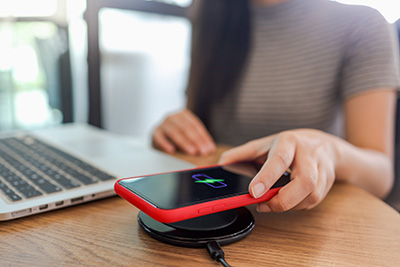
With power restored, there are just a few final steps to get everything back to normal and be prepared for the next power outage.
Reconnect Electronics and Appliances
If you unplugged anything before or during the power outage, it’s now safe to plug them back in one at a time. You may need to reset clocks and settings on some devices.
Put Away Backup Power
Portable generators typically have multi-step processes for shutdown and storage, and you should refer to manufacturer’s instructions to complete these. If you have a gas or diesel generator, this will include either burning off the remaining fuel through standard use or draining the fuel into an appropriate container.
Standby generators will shut down automatically, and solar chargers and generators only need to be disconnected and stored carefully. Power banks should be recharged so they’re ready to go when they’re needed next.
Dispose of Spoiled Food
If you haven’t already done so, throw away any perishable foods from your fridge and freezer that may have spoiled. This includes refrigerated foods that have gone more than four hours without refrigeration, and frozen foods that have been warming for more than 48 hours in a full freezer or 24 hours in a half-full freezer. Do not taste potentially spoiled food to determine whether it’s safe to keep – it’s better to be safe than sorry.
Replenish Your Emergency Kit
If you used any of your stored food, water, batteries or first aid supplies from your emergency kit, replace them for next time.
A little preparation makes a lot of difference. Schedule time to build your emergency kit, register for utility alerts and complete other preparations so that your next power outage is as safe and comfortable as possible.
Looking for Something Specific?
Select a category to find resources for topics that interest you.
Select Category

Related Articles:
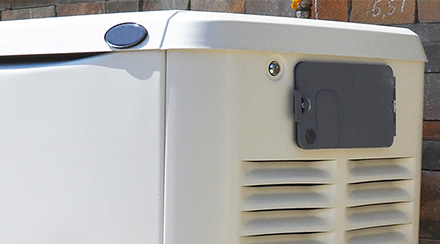
How to Choose a Generator for Your Home
Power outages can be miserable, but with the right generator, you can keep your family safe and comfortable until power is restored. Learn how to choose the best generator for your home.
Read Article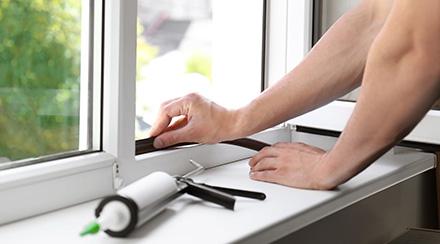
Weatherize Your Home for Summer
The extreme heat of summer can really do a number on your energy bills. But if you’re able to invest a little time and money into weatherizing to keep your home cool, you can help yourself and your family remain comfortable at home while still saving energy.
Read Article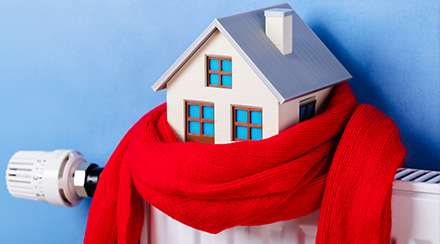
How to Weatherize Your Home for Winter
No matter how much you may enjoy walking in a winter wonderland, the frosty elements can take a toll on your home, yard and utility bills. So before the temperature plummets, it’s important to take some time to weatherize your home for winter.
Read ArticleWhat to Do Before, During and After Power Outages
Power outages are always inconvenient, and they can even be dangerous. But with a little knowledge and preparation, you can protect yourself, your home and your belongings for power outages of any duration. Read on to learn what to do when power goes out.
Prepare for a Power Outage
Sometimes you can see a potential power outage coming hours or even days away, such as when severe weather is forecasted. Other times, it may come as a surprise due to an event like a vehicle toppling a utility pole. Some may even be announced in advance, such as when an energy utility announces a temporary rolling power outage to protect the grid during periods of excessive energy demand.
The key to getting through a power outage safely and comfortably is to be prepared for any type of outage, even the ones you don’t see coming.
Prepare an Emergency Kit
Every home should have an emergency kit, and every member of the household should know where it’s stored. The most important items to include are:
- Water; at least three gallons per household member
- Non-perishable food; at least three days’ worth for the entire household
- Flashlights
- Battery-powered radio
- Batteries
- First aid kit
- Prescription medications
You may also want to include copies of important documents, such as birth certificates and insurance policies. Stored food and water should be consumed and replaced periodically to keep the kit fresh.
Prepare Emergency Lighting for Power Outage Safety
A sudden power outage can leave you fumbling through the dark, and this can be hazardous, especially for people with mobility issues. Keeping small flashlights stored in easy-to-reach places throughout your home ensures that you’re never far from an emergency light source. Make sure everyone in the home knows where these are located.
Prepare Backup Power
You can invest in all sorts of backup power solutions, from whole home generators that start automatically to wallet-sized solar panels for charging your phone. Take time to assess your budget and backup power needs so you can make an informed purchase before an emergency occurs.
If you choose a fuel powered generator, be sure to familiarize yourself with all safety guidelines and make a plan for where you will operate the unit. Gas, diesel and propane generators must be operated at least 20 feet from any occupied structure to minimize the risk of carbon monoxide poisoning. You should also ensure your generator is connected safely; extension cords must be rated for generator use and long enough to account for the distance between the generator and the house. If you’d prefer to connect a generator directly to your home’s electrical panel, you should have a device called a transfer switch installed by a licensed electrician.
Generators range in price from a few hundred dollars to several thousand, but you don’t need to spend big to have a little backup power. Small electronics like solar chargers and power banks can be purchased for under $50, giving you a way to power phones, radios and other small electronics in an emergency.
Sign Up for Alerts
Most utilities allow customers to opt-in for text alerts about outages and other events affecting service. If you’re not already registered for these alerts, look on the websites of your utilities or check your most recent energy bills for instructions. In the event of a power outage, your energy utility may be able to text you with an estimated time of service restoration.
Take Advantage of Advance Warning
The tips outlined above will help you be prepared for those power outages you don’t see coming, but if you have the benefit of prior warning, you can do even more. If a hurricane, tropical storm or severe weather outbreak is forecasted for your area, consider taking a few additional steps:
- Clean your fridge and freezer of unwanted and expired foods.
- Put refrigerated and frozen meat and produce inside plastic bags, then put them back in place. If the power is out so long that they become unsafe to eat, this makes it cleaner and easier to dispose of spoiled food.
- Fully charge your mobile devices.
- Fill your car’s gas tank.
- Unplug sensitive electronics around your home, especially if they’re not connected to surge protectors.
During a Power Outage
When a power outage begins, the first priority is to make sure everyone in the home is safe. Carefully find your nearest emergency light source if you’re in the dark, then make contact with each member of the household.
Why Is My Power Out?
If the cause of the power outage isn’t readily apparent, you can call your energy utility to report a power outage. If you’ve signed up for text alerts, your utility is also likely to reach out to you. Use your radio and web-connected smartphone, if you have one, to check for updates if you believe the outage is the result of severe weather.
Don’t Use Your Stove or Oven for Heat
If the power goes out during cold weather and shuts down your furnace, you might be tempted to use a gas stove or range for emergency heat. This is a dangerous idea, as it will release carbon monoxide into your home. Carbon monoxide is colorless, odorless and tasteless, and can cause headaches, nausea, dizziness and other symptoms. Prolonged exposure to high levels of carbon monoxide can even be fatal. Instead of using your oven, dress in warm layers, including outerwear, hats and gloves, if necessary. Wrap yourself in a blanket for additional warmth and hang blankets over exterior windows and doors to help block out cold drafts.
Keep the Fridge and Freezer Closed
A lengthy power outage can cause your frozen and refrigerated food to spoil. To help avoid this, keep the fridge and freezer closed until you know spoilage is imminent. Refrigerated foods should be considered unsafe after four hours with no cooling, so if you’re approaching the four-hour mark, it’s time to open the fridge and either consume or throw away your perishables. A full freezer will keep food safe for up to 48 hours, and a half-full freezer for 24 hours. But if you open your fridge or freezer prematurely and let warm air inside, these estimates no longer apply.
Report Downed Power Lines
If you can see downed power lines, do not approach them. You should always assume that downed power lines are active and that the surrounding area is electrified, especially if it’s wet. Call 911 or your electrical utility to report the problem.
Unplug Electronics and Appliances
Unless you have a whole-home surge protection system, it’s a good idea to unplug electronics and appliances during a power outage. This is especially true for delicate electronics like computers, monitors, televisions and smart devices. When the power comes back on, it may briefly send a surge of electricity through your home wiring that can permanently damage electronics and appliances.
Conserve Your Phone Battery
If you have no way to recharge your phone, you’ll want to conserve as much battery power as possible by doing the following:
- Only use your phone for important calls, texts and searches for information related to your power outage or weather event.
- Turn your screen brightness down as low as possible.
- Make sure your screen is off whenever your phone is not in use.
- Mute the speaker.
- Disable vibrations.
- Disable location services.
- Disable WIFI and Bluetooth, if possible.
- Switch to a smartphone background or theme with dark colors.
- Check your phone’s settings menu for additional battery or power-saver settings.
Another way to keep your phone running throughout a power outage is to plan ahead by purchasing a portable power bank. Some of the higher capacity power banks have enough power to recharge several phones, allowing you to stay connected and even help your neighbors do the same.
Set Up Your Backup Power
If the power goes out without enough notice to set up your backup power, you should wait to set it up until it’s safe to do so. In the event of severe weather, that means waiting for the storm to completely pass. If you have a standby generator, you shouldn’t need to do anything – it will start on its own a few seconds after the power cuts out. But if you have a portable generator, you’ll need to set it up a safe distance from your home – at least 20 feet. Follow the manufacturer’s instructions, as generator safety features and functions vary by model.
Fuel-burning generators that run on gasoline, diesel or propane cannot be safely used indoors. Solar chargers and solar generators, however, do not produce any harmful emissions and can be used as soon as they’re needed, though cloudy weather may limit how much solar energy you can harvest. You can also purchase high-capacity battery backup systems that connect directly to your electrical panel, allowing you to keep essential circuits powered for hours or even days. Plan ahead for your emergency power needs by browsing solar generators and backup systems and finding the right fit for your home.
After a Power Outage
With power restored, there are just a few final steps to get everything back to normal and be prepared for the next power outage.
Reconnect Electronics and Appliances
If you unplugged anything before or during the power outage, it’s now safe to plug them back in one at a time. You may need to reset clocks and settings on some devices.
Put Away Backup Power
Portable generators typically have multi-step processes for shutdown and storage, and you should refer to manufacturer’s instructions to complete these. If you have a gas or diesel generator, this will include either burning off the remaining fuel through standard use or draining the fuel into an appropriate container.
Standby generators will shut down automatically, and solar chargers and generators only need to be disconnected and stored carefully. Power banks should be recharged so they’re ready to go when they’re needed next.
Dispose of Spoiled Food
If you haven’t already done so, throw away any perishable foods from your fridge and freezer that may have spoiled. This includes refrigerated foods that have gone more than four hours without refrigeration, and frozen foods that have been warming for more than 48 hours in a full freezer or 24 hours in a half-full freezer. Do not taste potentially spoiled food to determine whether it’s safe to keep – it’s better to be safe than sorry.
Replenish Your Emergency Kit
If you used any of your stored food, water, batteries or first aid supplies from your emergency kit, replace them for next time.
A little preparation makes a lot of difference. Schedule time to build your emergency kit, register for utility alerts and complete other preparations so that your next power outage is as safe and comfortable as possible.
Looking for Something Specific?
Select a category to find resources for topics that interest you.
Select Category

Related Articles:

How to Choose a Generator for Your Home
Power outages can be miserable, but with the right generator, you can keep your family safe and comfortable until power is restored. Learn how to choose the best generator for your home.
Read Article
Weatherize Your Home for Summer
The extreme heat of summer can really do a number on your energy bills. But if you’re able to invest a little time and money into weatherizing to keep your home cool, you can help yourself and your family remain comfortable at home while still saving energy.
Read Article
How to Weatherize Your Home for Winter
No matter how much you may enjoy walking in a winter wonderland, the frosty elements can take a toll on your home, yard and utility bills. So before the temperature plummets, it’s important to take some time to weatherize your home for winter.
Read Article






